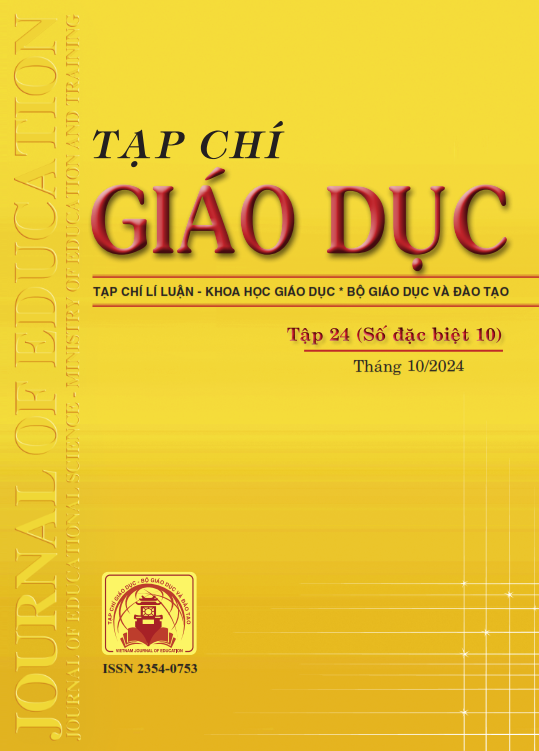Nghiên cứu đề xuất khung năng lực dạy học STEM của giáo viên phổ thông tại Việt Nam
Tóm tắt
STEM education is a modern educational approach that is being emphasized in the educational programs of many developed countries such as the United States, Germany, the United Kingdom, etc. In Vietnam, the Ministry of Education and Training has also directed the implementation of STEM education in recent years. The separation of the four fields of science, technology, engineering, and mathematics has become a significant barrier in the current educational system. STEM education in schools helps to create interdisciplinary connections between these fields, providing students with real-world experiences related to life. Teaching and learning STEM not only stimulates students' thinking, increases their interest in learning, but also helps them gain a deeper understanding of the knowledge being taught and create links between different subjects. The effectiveness of organizing STEM education in secondary schools largely depends on the STEM teaching competence of teachers, therefore, identifying the STEM teaching competence of general education teachers is crucial for the implementation of STEM education at the secondary level in Vietnam. This paper presents the research results on building a competency framework for STEM teaching for general education teachers in Vietnam, providing a foundation for scientists to evaluate the STEM teaching competence of general education teachers and propose measures to enhance their STEM teaching competence.
Tài liệu tham khảo
Bell, D. (2017). STEM education in the 21st century: learning at work - an exploration of design and technology teacher perceptions and practices. International Journal of Technology and Design Education.
Bộ GD-ĐT (2020). Công văn số 3089/BGDĐT-GDTrH ngày 14/8/2020 về việc triển khai thực hiện giáo dục STEM trong giáo dục Trung học.
Chachashvili-Bolotin, S., Milner-Bolotin, M., & Lissitsa, S. (2016). Examination of factors predicting secondary students’ interest in tertiary STEM education. International Journal of Science Education, 38(3), 366-390. https://doi.org/10.1080/09500693.2016.1143137
Gleason, N. W. (2018). Higher Education in the Era of the Fourth Industrial Revolution. Higher Education in the Era of the Fourth Industrial Revolution, 1-229. https://doi.org/10.1007/978-981-13-0194-0
Kelley, T. R., & Knowles, J. G. (2016). A conceptual framework for integrated STEM education. International Journal of STEM Education, 3(1). Springer. https://doi.org/10.1186/s40594-016-0046-z
Koehler, M. J., & Mishra, P. (2009). What is technological pedagogical content knowledge? Contemporary Issues in Technology and Teacher Education, 9(1). http://www.tpck.org/.
Lê Văn Hồng, Lê Ngọc Lan, Nguyễn Văn Thàng (2007). Tâm lí học lứa tuổi và Tâm lí học sư phạm. NXB Đại học Quốc gia Hà Nội.
Mpofu, V. (2012). A Theoretical Framework for Implementing STEM Education. In Theorizing STEM Education in the 21st Century: Vol. I (Issue tourism, p. 13). https://doi.org/10.1016/j.colsurfa.2011.12.014
Phạm Thị Thùy Trang (2021). Phát triển năng lực dạy học STEM cho sinh viên Sư phạm hóa học. Luận án tiến sĩ Khoa học giáo dục, Trường Đại học Sư phạm Hà Nội.
Shulman, L. (1987). Knowledge and teaching: Foundations of the new reform. Harvard Educational Review, 57(1), 1-23.
Siekmann, G., & Korbel, P. (2016). Defining “STEM” skills: review and synthesis of the literature. Commonwealth of Australia. http://www.lsay.edu.au
Song, M. (2020). Integrated STEM teaching competencies and performances as perceived by secondary teachers in South Korea. International Journal of Comparative Education and Development, 22(2), 131-146. https://doi.org/10.1108/IJCED-02-2019-0016
Tytler, R. (2020). STEM Education for the 21st century. September, 1-12. https://doi.org/10.1007/978-3-030-52229-2
Thái Văn Thành, Nguyễn Thị Nhị, Lê Thị Bình (2022). Mô hình quản lí giáo dục STEM ở trường phổ thông. Tạp chí Khoa học Giáo dục Việt Nam, 18, 1-7.
Đã Xuất bản
Cách trích dẫn
Số
Chuyên mục
Giấy phép

Tác phẩm này được cấp phép theo Ghi nhận tác giả của Creative Commons Giấy phép quốc tế 4.0 .












